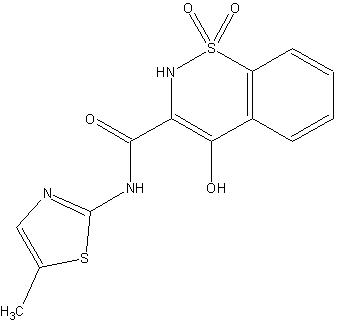Clinical Question: Is meloxicam as safe as other nonsteroidal anti-inflammatory drugs (NSAIDs)?
Setting: Various (meta-analysis)
Study Design: Meta-analysis (randomized controlled trials)
Synopsis: Meloxicam is an NSAID that preferentially inhibits the cyclooxygenase-2 receptor. Investigators pooled data from 28 published and unpublished trials that included a total of 24,196 patients to assess the safety profile of meloxicam. The duration of most trials was 60 days or less. Meloxicam in a dosage of 7.5 mg or 15 mg per day (n = 13,118) was compared with diclofenac in a dosage of 100 to 150 mg per day (n = 5,464), piroxicam in a dosage of 20 mg per day (n = 5,371), or naproxen in a dosage of 500 mg twice per day (n = 243).
Serious gastrointestinal (GI) complications included gastric or duodenal perforation, gastric outlet obstruction, and hemodynamically important GI bleeding. Thromboembolic events included myocardial infarction and stroke, but not deep venous thrombosis or pulmonary embolism. The investigators who judged whether adverse events met the definitions used in this study were blinded to treatment allocation.
Fifty-four serious GI events occurred in less than 1 percent of any treatment group, meaning that all numbers needed to treat to harm (NNH) would be more than 100. Significantly fewer GI events occurred in patients receiving the 7.5-mg dosage of meloxicam compared with each of the other NSAIDs. At the 15-mg dosage, the risk with meloxicam was significantly less than the risk with piroxicam only. Thromboembolic events were less frequent with either dosage of meloxicam than with diclofenac (NNH = 720; 95 percent confidence interval, 320 to 5,717). There were no differences in the risk of cardiovascular events occurring with meloxicam compared with piroxicam or naproxen, with trends favoring meloxicam.
Bottom Line: Short-term meloxicam at the 7.5-mg daily dosage is less likely than piroxicam, diclofenac, or naproxen to be associated with serious GI complications. However, the absolute risk differences are less than 1 percent. Meloxicam has not been shown to be associated with heart attacks and strokes. A direct comparison with ibuprofen is needed. (Level of Evidence: 1a)
Study Reference: Singh G, et al. Risk of serious upper gastrointestinal and cardiovascular thromboembolic complications with meloxicam. Am J Med July 15, 2004;117:100-6.
Used with permission from French L. Meloxicam as safe as some other NSAIDs. Accessed online January 25, 2005, at: http://www.InfoPOEMs.com.
COPYRIGHT 2005 American Academy of Family Physicians
COPYRIGHT 2005 Gale Group



